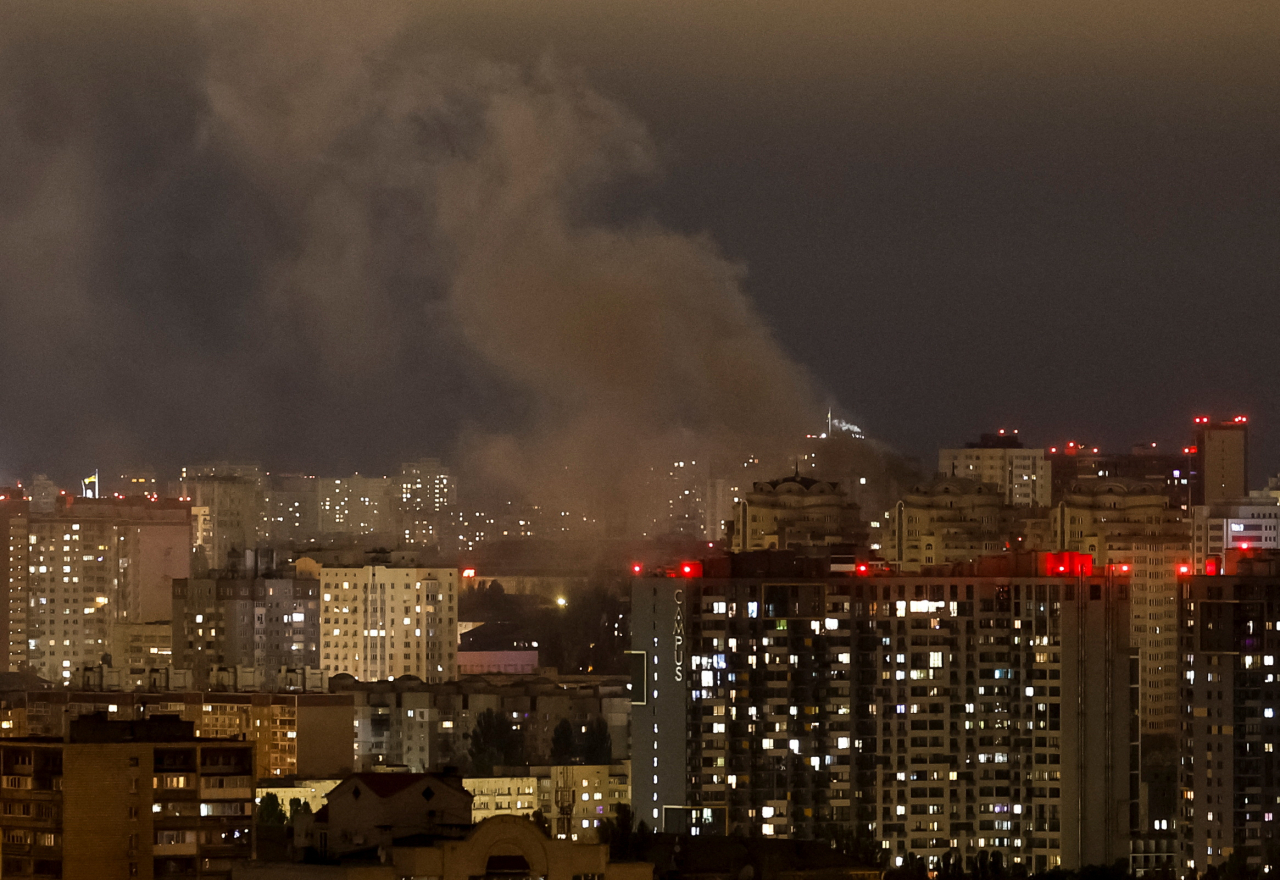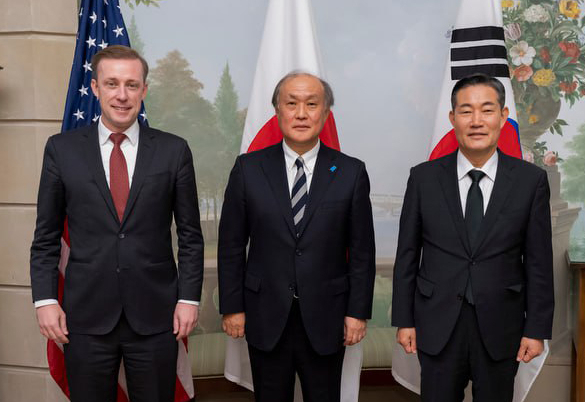
 |
| Smoke rises in the sky over the city after a Russian drone strike, amid Russia's attack on Ukraine, in Kyiv, Ukraine October 25. (Reuters) |
Growing indications suggest that North Korean troops are on the brink of deployment to support Russia’s war efforts in Ukraine, as North Korean soldiers have reportedly arrived in Russia's Kursk region, where Russian and Ukrainian forces have been battling for control of key strategic border location.
Ukrainian President Volodymyr Zelenskyy said Friday that Russia is expected to deploy the first contingent of North Korean soldiers to combat zones as early as Sunday and Monday, based on an intelligence report from Oleksandr Syrskyi, commander in chief of the Ukraine armed forces.
The Ukrainian Ministry of Defense's Main Directorate of Intelligence reported Thursday that the first units of North Korean military personnel, trained at Russian training grounds in the east, have already arrived in the combat zone of the Russia-Ukraine war. The presence of North Korean troops was recorded in the Kursk region Wednesday, according to the military intelligence agency.
Kursk, in southwestern Russia, has been a contested border area where Ukrainian forces have been engaged since early August.
Several thousand North Korean soldiers have arrived in Russia’s Kursk region, where they are expected to join Russia's counteroffensive against Ukraine, The New York Times reported Friday, citing one unnamed Ukrainian and two American officials.
The officials noted that the North Korean troops had not yet engaged in combat, and their exact role remains unclear. Regardless of their role, they emphasized that the presence of a significant North Korean contingent would enable Russia to retain more of its forces in eastern Ukraine and allow them to concentrate on seizing Ukrainian territory before the onset of harsh winter conditions.
Kim Yong-bok, deputy chief of the General Staff of the Korean People's Army, has reportedly arrived in Russia to oversee North Korean troops stationed there, Japan's Kyodo News Agency reported Saturday, citing an unnamed Ukrainian military source.
Kim Yong-bok accompanied North Korean leader Kim Jong-un in key public military activities, notably including inspecting the KPA's special operations training bases in the western region in October and inspecting the training base of the special operation forces of the KPA in September.
The US, NATO, South Korea, Japan and other countries have confirmed the dispatch of North Korean troops to Russia, though assessments of the scale vary. Ukraine’s Western allies, including the US, have been cautious about specifying the exact role of North Korean forces on the battlefield.
In a debrief to the National Assembly on Wednesday, South Korea's National Intelligence Service said that following an initial deployment of around 1,500 North Korean troops to Russia in August, some additional 1,500 have since been dispatched. To date, approximately 3,000 North Korean soldiers have been sent to Russia, with South Korean intelligence anticipating around 10,000 to be deployed by December.
The White House confirmed on Wednesday that intelligence agencies estimated North Korea had moved at least 3,000 soldiers into eastern Russia between early and mid-October, where they were currently undergoing training at multiple Russian military sites.
 |
| South Korea's National Security Adviser Shin Won-sik (right) and his U.S. and Japanese counterparts, Jake Sullivan (left) and Takeo Akiba, respectively, pose for a photo as they meet for three-way talks in Washington, D.C., on Oct. 25 in this photo released by the South Korean presidential office. (Yonhap) |
Seoul to meet Washington, NATO
This week, the South Korean government is expediting consultations with the US and NATO in response to the issue.
South Korean Defense Minister Kim Yong-hyun and US Defense Secretary Lloyd Austin are scheduled to hold the Security Consultative Meeting, annual defense-ministerial dialogue between the treaty allies, on Oct. 30 in Washington. According to South Korea’s Defense Ministry, the talks will address key defense issues, including North Korea’s dispatch of troops to Russia.
The South Korean government delegation is set to brief the North Atlantic Council at NATO headquarters on Monday, updating ambassadors from 32 member countries on developments related to North Korea’s troop deployment to Russia, the NIS announced Friday. Following this, the delegation will deliver a related briefing to the European Union’s Political and Security Committee.
South Korea's national security adviser Shin Won-sik also met with his US and Japanese counterparts, Jake Sullivan and Takeo Akiba, in Washington on Friday. The three "expressed grave concern" over North Korea's troop deployments to Russia, "potentially for use on the battlefield against Ukraine," according to a White House press statement.
Both Moscow and Pyongyang have adopted a stance of neither confirming nor denying North Korean troops dispatched to Russia.
President Vladimir Putin said Friday on Rossiya-1 TV channel that it is "entirely our own business" between Moscow and Pyongyang whether and how to apply the military assistance article of the Comprehensive Strategic Partnership Treaty. Russia's State Duma ratified the treaty Thursday.
In June, Putin and Kim signed the Treaty on Comprehensive Strategic Partnership, which includes Article 4 that stipulates both countries to "provide military and other assistance using all means at its disposal without delay" if either party enters a state of war due to a military invasion by one or more countries.
Kim Jong-gyu, North Korea's vice foreign minister in charge of Russian affairs, said Friday that the country's Foreign Ministry "does not feel the need to confirm it separately" in a statement responding to what he labeled as the "rumor of the dispatch of KPA troops to Russia."
"If there is such a thing that the world media is talking about, I think it will be an act conforming with the regulations of international law," the statement read.









